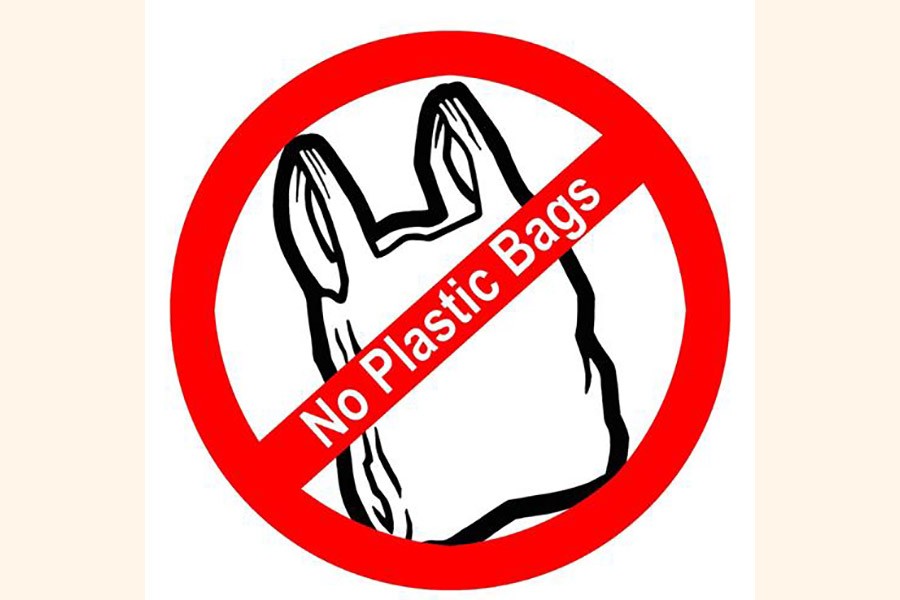
Published :
Updated :

Pollution caused by widespread use of plastic products, including polythene bags, has turned out to be a grave concern for us nowadays. Reports say a person in Bangladesh currently uses 7.5 kilograms of plastic items every year while some 5,000 industries, including big and small ones, are producing 1.2 million tonnes of plastic annually. Environmentalists, based on some researches and information, have said that the use of plastic was 15,000 tonnes in 1990, which skyrocketed to a whopping 750,000 tonnes within just 20 years by the year 2010.
Production of polythene is banned here by law, but still it is in use. A single family in Dhaka uses four polythene bags everyday. Around 20 million polythene bags are being consumed in the capital city on a daily basis, many of which are being dumped in drains and waterbodies causing waterlogging. The government on January 1, 2002 banned manufacturing, marketing and using polythene shopping bags in Dhaka. Later, a countrywide ban was made effective from March 31 of the same year.
Experts say use of polythene is causing different types of diseases, including cancer, to human body. From poisoning and injuring marine life to presence of plastics in food to disrupting human hormones and causing major life-threatening diseases, the exponential growth of plastics is threatening our planet's survival. Polythene use in Bangladesh is more harmful compared to the same in the neighbouring countries mainly because of a poor waste management here. Of late, a relatively new item called tissue bag, which is also harmful for health and environment, is gaining popularity here. At present, around 3.0 million tissue bags are being produced in our country daily.
Against this backdrop, the Earth Day 2018 was observed on Sunday across the world, including Bangladesh, with this year's slogan 'End Plastic Pollution.' Observance of the day is significant as it's a day of civic participation towards preserving the planet. People march, sign petitions, meet their elected officials, plant trees, clean up their towns and roads marking the occasion.
It is evident that plastic contains residual chemical, chemical additives, and degradation products that can leach out as they're not strongly linked to the plastic polymer. They can also adsorb toxic elements. As much as it supports the ever-growing demands of humans and adds to our ease and convenience, these cost-effective consumer offerings are detrimental. A paper published in scientific journal Chemistry & Biology reveals that plastic is non-biodegradable and disposed plastic can remain in the environment for up to 2,000 years!
Hence we should realise the ill effects and take effective actions before it's too late. Besides causing damage to environment, using plastic is hazardous to human health. So, we need to recognise the threat from plastic use and then resolve to make the planet a better place to live in.
We can look at some ways to limit our day-to-day plastic usage like promoting reusable water bottles, carrying our own non-plastic bags while shopping in the kitchen market or elsewhere, and avoiding microplastics which is a major source of polluting the rivers, oceans, and other waterbodies. We should also boycott disposable glasses, spoons, forks, and razors - everything that has plastic in it and such caution should be a regular practice to follow. In fact, one should steer clear of everything that is disposable or has a 'disposable' label on it. We can also adopt a more environment-friendly way of going about some basics like using less of plastic packaging, conserving water, buying organic local fresh produce, putting a stop to food wastage and growing our kitchen garden to serve our mother earth in a better way.
As long as people keep accepting plastic items, businesses will continue to provide the same. Spreading awareness, therefore, is very crucial. Besides, the government should ensure exemplary punishment for those violating the law that banned polythene. Appropriate initiatives, including not only formation but also empowerment of an inter-ministerial committee, are required to execute the ban. Proper action on the part of the enforcement agencies is a must to stop unabated use of plastic materials and unhindered import of raw materials for making all sorts of plastic, polythene and tissue bags. There should be coordination among authorities concerned in this regard. Steps should also be taken to encourage people to use environment-friendly alternatives. The government does have a vital role to play by way of offering suitable alternatives like jute. Mere dependence on enforcement is bound to be self-defeating unless the people are provided with better options.


 For all latest news, follow The Financial Express Google News channel.
For all latest news, follow The Financial Express Google News channel.